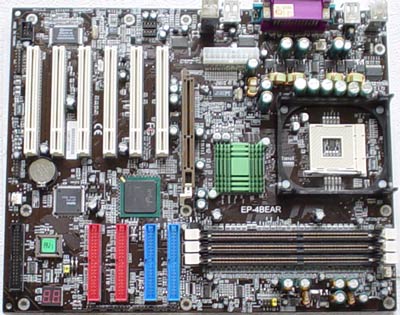Intel 845E Motherboard Roundup - August 2002
by Evan Lieb on August 5, 2002 1:07 AM EST- Posted in
- Motherboards
Epox 4BEAR
|
Motherboard Specifications |
|
|
CPU
Interface
|
Socket-478
|
|
Chipset
|
Intel
82845E MCH
Intel 82801DB ICH4 |
|
Bus
Speeds
|
90-200MHz
(in 1MHz increments)
|
|
Core
Voltages Supported
|
up to 1.85V
|
|
I/O
Voltages Supported
|
N/A
|
|
DRAM
Voltages Supported
|
up
to 2.75V
|
|
Memory
Slots
|
3
184-pin DDR DIMM Slots
|
|
Expansion
Slots
|
1
AGP 4X Slot
6 PCI Slots |
|
Onboard
RAID
|
High
Point HPT372 Controller
|
|
Onboard
USB 2.0/IEEE-1394
|
USB2
Supported through South Bridge
|
|
Onboard
LAN
|
N/A
|
|
Onboard
Audio
|
Realtek
ALC650
|
With the 4BEAR, Epox decided to integrate a Highpoint HPT372 (ATA133) RAID controller capable of RAID 0, 1, and 0+1 arrays. In total, you can connect a maximum of 8 IDE devices to the 4BEAR, which should be plenty for most people.
We don't have many complaints about the general layout of the 4BEAR. There's a small green passive heatsink over the MCH (North Bridge) for cooling, and everything else is laid out pretty much the way most of the other 845E boards were laid out. We weren't totally content with the fact that Epox decided to not include the ATX12V connector that Intel recommends for all Pentium 4-based motherboards. Not having the ATX12V connector isn't a huge loss as long as you have a P4 approved power supply though, so it's a non-issue really. Epox's position on the matter is that the ATX12V connector isn't really necessary as long as you're using the right (P4 approved) PSU, but we wonder why Epox couldn't have just included it anyway, since it's hardly an expensive item to implement. If you don't have a P4-approved power supply however, you could definitely see sporadic behavior from the 4BEAR. Then again, it's unwise in any situation to not be using an approved PSU in the first place.
We would have liked to have seen an onboard 1394a (FireWire) chip, as most motherboard makers are starting to not only include separate 1394a chips on their motherboards but also 1394a support in their chipsets. For example, SiS decided to implement support for 1394a in their Socket A SiS 746 chipset as well as their Socket 478 SiS 648 chipset. NVIDIA too decided that native 1394a support in their nForce 2 chipset was the best route to take.
Stressing the 4BEAR
Overall, the 4BEAR was solid during all our stress tests. With all 3 DIMM slots
populated with Kingston DDR266 memory at stock speeds and SPD timings, the 4BEAR
was able to pass all Prime95 torture tests in addition to all our benchmarks.
Usually, we run our benchmarks with one stick of memory to ensure that we at
least will get performance data to look at without worrying about crashes. But
when stressing a board we want to see how well it does in more difficult situations.
In this case, populating all DIMM slots with DDR266 memory should really test
how reliable the motherboard/chipset's memory implementation is. All in all,
the 4BEAR passed all the stress tests under these conditions. We were also able
to rerun our entire benchmark suite with all memory slots populated.
Currently, the Epox 4BEAR goes for about $120 shipped in the U.S. (depends on
the location). This is a fairly good deal for what you get (USB 2.0, sound,
RAID, good overclocking options and BIOS features), but, we think there are
better boards on the market with more features for a similar price. For example,
in an upcoming article, we'll be taking a look at the Epox 4G4A+, so stay tuned.











0 Comments
View All Comments